Picture this. You're in your kitchen cooking your favorite meal, surrounded by the smells of freshly chopped vegetables and sizzling meat. Suddenly, the knife slips, and you cut your finger. It's a small injury, but it stings like crazy.
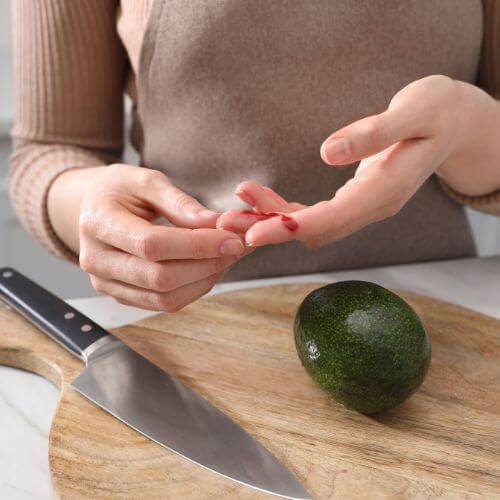
Accidents happen, but what if that had been a more serious injury? It's a sad truth that kitchen safety is often overlooked, but it's one of the most important safety considerations in a home.
Have you considered all the potential dangers lurking in your kitchen? It's not just sharp objects that can cause harm – open flames on the stove or electrical appliances can lead to fires, shocks, or thermal burns. Today, we'll share some valuable tips to help you minimize the risks of accidents and injuries in your kitchen.
We all know that the kitchen is the hub of family life – it's where we cook, eat, and celebrate with loved ones.

The last thing anyone wants is for the heart of their home to become a danger zone. Kitchen safety isn't just about preventing minor accidents; it's about ensuring the safety and well-being of everyone in your household. Proper safety precautions protect your loved ones and ensure that everyone can enjoy cooking together, free from fear and danger.
Ready to get started on kitchen safety? Great! Continue reading our blog post for a comprehensive list of tips and tricks that will help you make your kitchen a safer place. We encourage you to share these tips with your family and urge them to take the same precautions, thereby reducing the risk of accidents in your home.
Above all, we invite you to print out the reminder list at the bottom of our article and post it in a prominent place in your kitchen - maybe on your refrigerator!
It's no secret that your kitchen can be a very dangerous place in your home, but it doesn't have to be! Here are some tips for staying safe in the kitchen, the busiest place in your home:
First Aid Kit:
ALWAYS keep a First Aid Kit where you can reach it at a moment's notice.

Keep knives sharp:
Dull knives are responsible for most kitchen accidents, but with a bit of elbow grease you can keep them sharp and accident-free! Use a honing steel to realign the blade’s blade geometry every few days and sharpen it with a stone once a month. Read our article on sharpening Damascus knives for more information on sharpening knives!
Furthermore, take care to always use the right cutting board material (wood or plastic) so that your knives stay in tip-top shape as well.
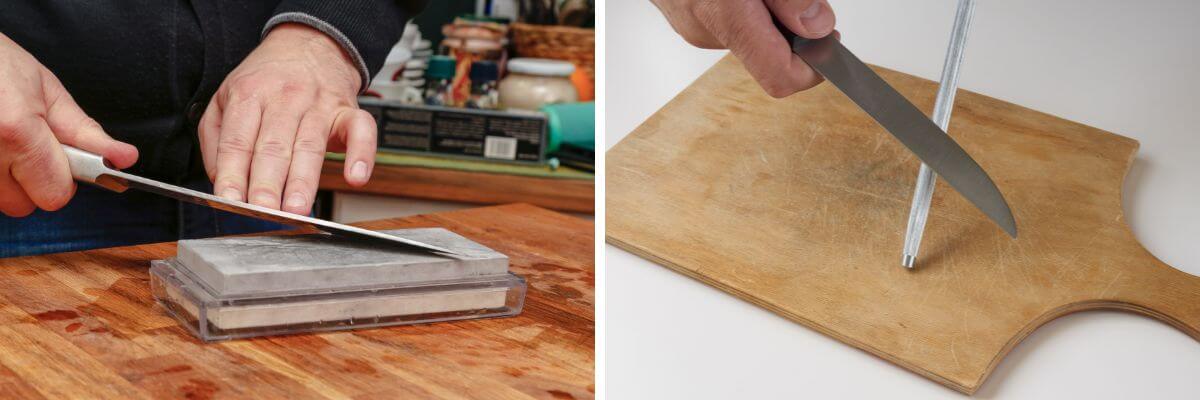
Be vigilant around hot surfaces:
Whether it's a stove top burner or an oven, it's essential to be mindful of hot surfaces while in the kitchen because they can cause serious burns. Always keep children away from these areas, and don't forget to use potholders or oven mitts with any hot pot, pan, or dish you come into contact with. Also, remember that pots and pans stay hot for quite some time after removal from heat sources - so handle them accordingly!

Keep an eye out for spills:
Spills can make your floors slippery and perilous, so always mop up spills as soon as you see them and dry off wet spots before walking on them.
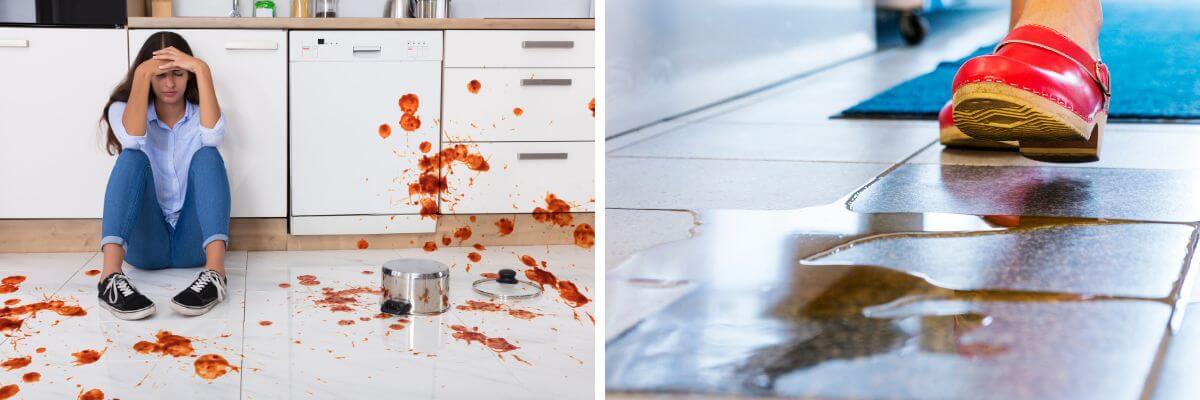
Make sure that any cleaning products used are safe for both humans and pets - check the label carefully for warnings or instructions regarding appropriate usage. If in doubt, consult your local hardware store for advice regarding safe floor cleaners you can use in your home kitchen, especially if you have a baby or toddler crawling around.
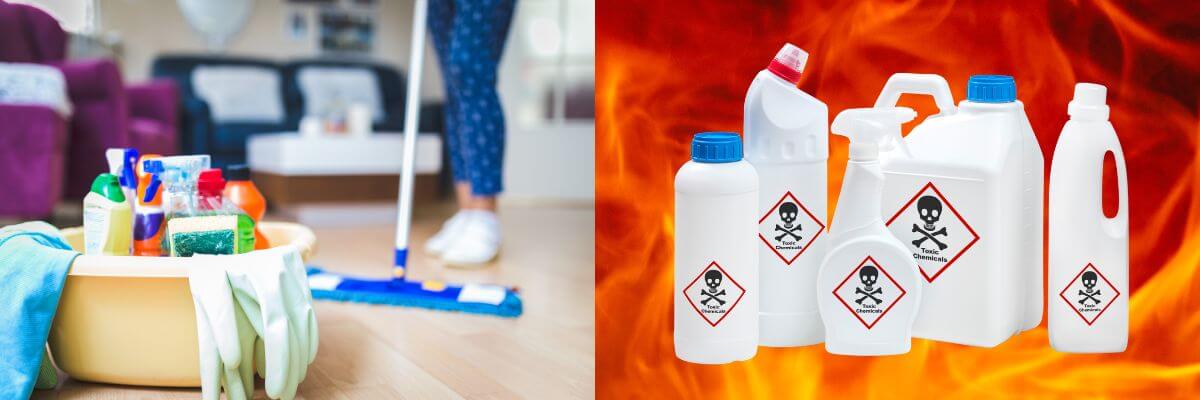
Avoid overcrowding electrical outlets:
Overloading outlets is unsafe as it increases the risk of an electrical fire breaking out - avoid using multiple splitters or adapters at all costs if possible! Regularly inspect outlets for signs of wear and tear such as exposed wiring which could create dangerous sparks when plugged into devices that require more electricity than usual (e.g., air fryers, toasters, air conditioners).
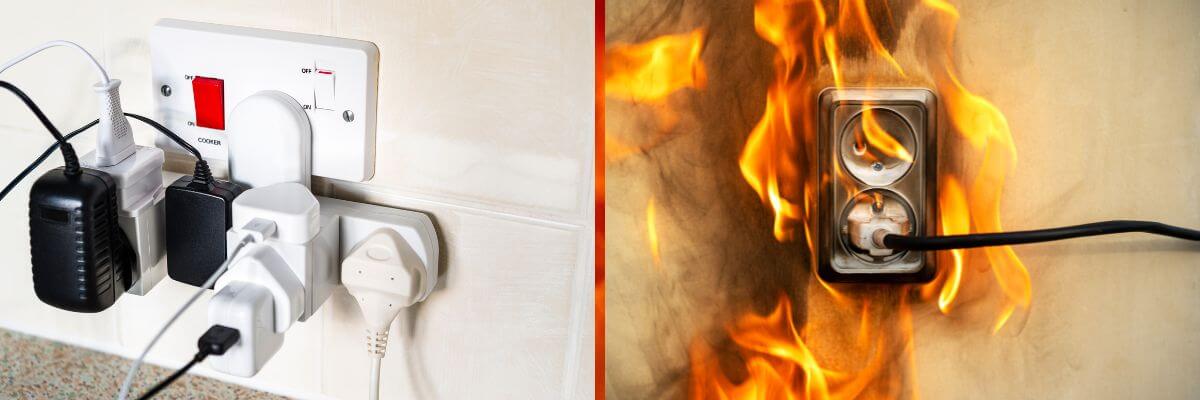
Store food properly:
Poor food storage is one of the most common causes of foodborne illness - so ensure that any perishable items are kept cold enough (40 °F/5 °C) by storing them in the refrigerator promptly after purchase or cooking, ideally within two hours at room temperature. This also applies to defrosted foods which should not remain outside of refrigeration longer than two hours before being consumed. Similarly, never thaw frozen food at room temperature; this will invite bacteria growth which can lead to poisoning.
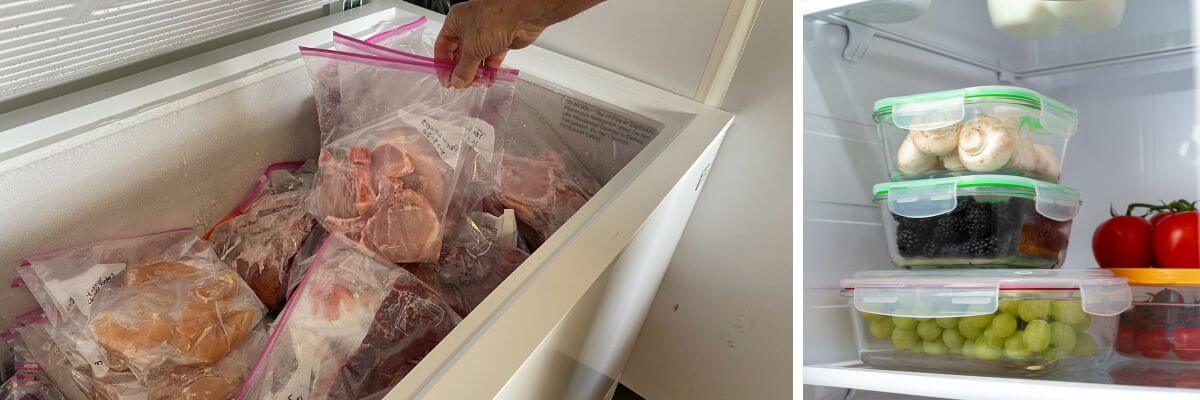
Wear non-slip shoes:
Bare feet can easily slip on wet floors resulting in nasty cuts or even broken bones - wearing non-slip shoes will help keep everyone standing upright while working in the kitchen! Look out for special anti-fatigue mats too, which provide extra cushioning against long sessions spent standing up while preparing meals.
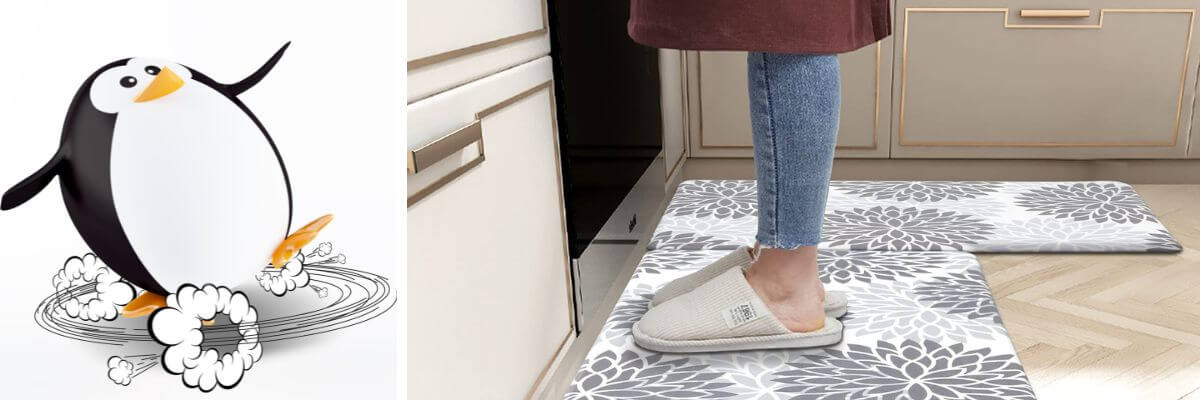
Wash dishes regularly:
Dirty dishes create an ideal environment for bacteria growth, thus increasing their risk of cross-contamination when preparing meals. Make sure to wash dishes at least once a day, preferably after each meal preparation session. Pay particular attention to utensils such as wooden spoons or pastry brushes that were used when preparing raw meats, poultry, or fish.
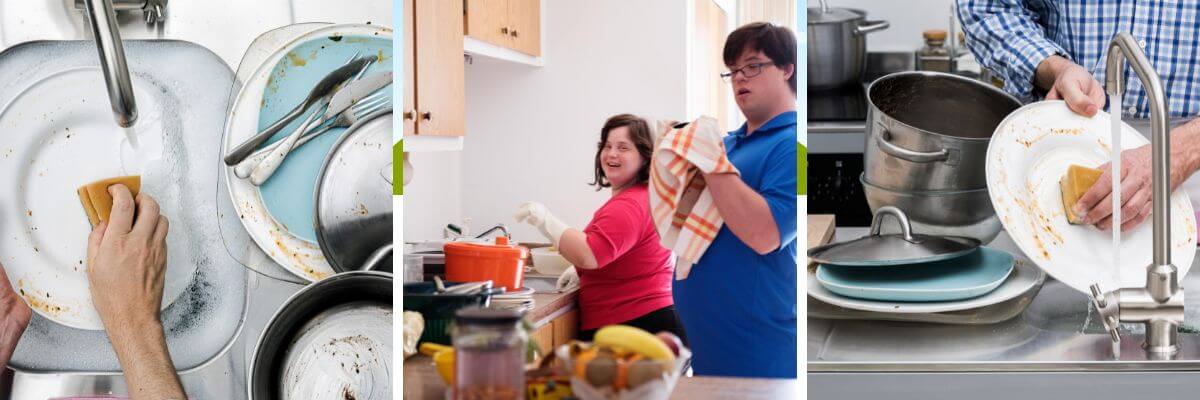
Unplug appliances after use:
Keeping small appliances plugged in creates an unnecessary risk of fire; unplugging them immediately after completing your task is a simple yet effective way of minimizing potential disasters inside the kitchen.
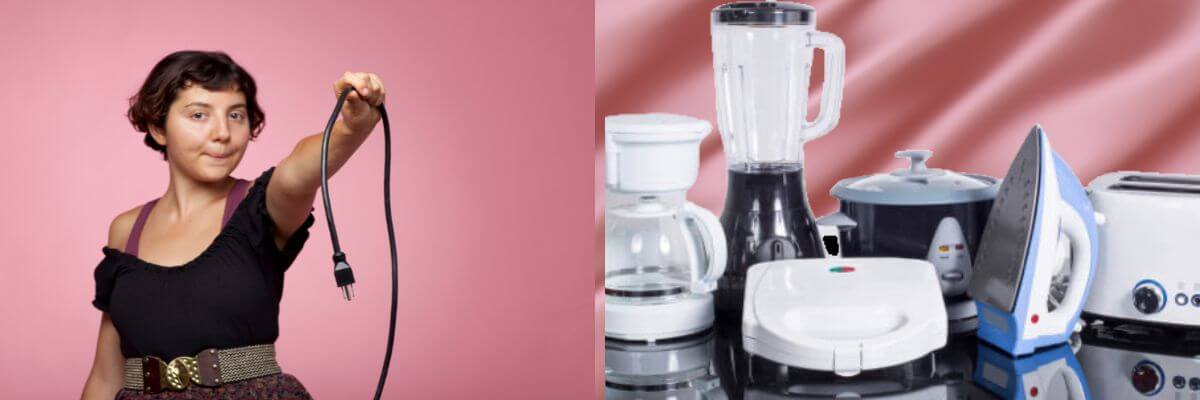
Keep towels and loose clothing away from hot surfaces:
Towels and loose clothing alike should not be worn near open flames or hot surfaces, such as stovetops or ovens—it takes only one spark to start a devastating fire! Remember too that aprons themselves are not flameproof —so avoid wearing billowy fabrics while cooking close to high temperatures whenever possible.
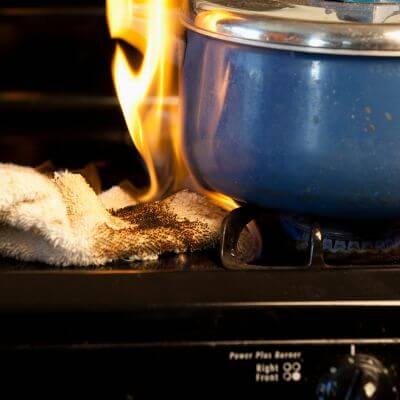
Always read instructions carefully:
Reading instructions carefully is paramount in understanding how any appliance works; always consider manuals provided by manufacturers, pay heed to their safety recommendations —and never assume you know what you're doing if something still isn't clear.

Fire extinguisher is a must in a kitchen:
A fire extinguisher in your kitchen is not an option - it is a must. Always be prepared to use it in case of an emergency fire and teach adults and children old enough to understand how to use it.
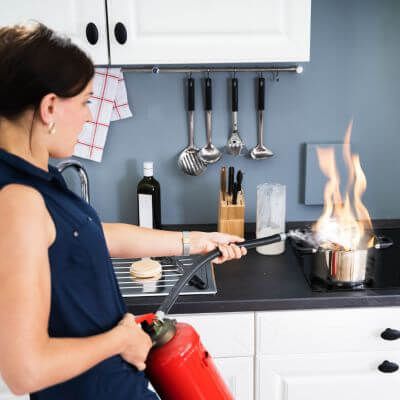

Bertie's FAQ Section
Welcome to our frequently asked questions section! We understand that kitchen safety is of utmost importance to you, and you still may have many questions. We have compiled a list of the most commonly asked questions surrounding kitchen safety that will help you navigate the potential hazards and minimize the risk of accidents in your kitchen. So, scroll down and find the answers you've been looking for!
What are the common causes of kitchen fires?
Kitchen fires are often caused by leaving food unattended on a stove, grease build-up in ovens, and malfunctioning appliances.
How can I prevent food poisoning?
Always wash your hands, keep your cooking area clean, and avoid cross-contamination of different foods to prevent foodborne illness. Keep cutting boards separate for veggies and raw meat. Always store foods properly.
What are the dangers of using dull knives?
Dull knives can be dangerous because they require more force to cut, increasing the risk of slipping and injuring yourself. Keep knives sharp and use a cutting board to prevent accidents.
How can I prevent burns in the kitchen?
When handling hot dishes or pots, use oven mitts or potholders to avoid burns. Don't store flammable items near the stove or oven, and use caution when cooking with hot oil or liquids. Do not lay dish towels near the stove. Keep toddlers away from the stove while cooking. Be careful of hot steam and hot liquids from pots on your stove.
What are the dangers of leaving appliances plugged in when not in use?
Leaving appliances plugged in can increase the risk of electrical shock or fire if an appliance malfunctions. Always unplug appliances when not in use.
What should I do if I start a small kitchen cooking fire?
If you have a small kitchen fire, use a fire extinguisher or baking soda to put out the flames. Never use water, as it can make cooking fires worse, especially with grease and electric fires.
How can I prevent slips and falls in the kitchen?
Keep floors clean and dry, wipe up spills and any broken glass immediately. Wear slip-resistant shoes and use slip-resistant mats in high-traffic areas of the kitchen.
What are the dangers of leaving children unattended in the kitchen?
Children can be curious and may accidentally touch hot surfaces. hot liquid, or sharp objects. Always supervise children in the kitchen and teach them about kitchen safety.
How can I properly handle and store knives?
Store knives in a block or on a magnetic strip, and never leave knives in a sink or dishwater. Keep knives sharp and use a cutting board to prevent accidents.
What are the dangers of using outdated or faulty appliances?
Old or broken appliances can malfunction and catch fire or cause electrical shocks. Regularly inspect and maintain your appliances and replace them when necessary.
Keep Your Kitchen Safe with These Basic Kitchen Safety Tips!
Taking the proper precautions when using your kitchen is key to ensuring a safe and enjoyable culinary experience. From keeping children away from hot surfaces to properly handling and storing knives, it's important to stay informed on how best to prevent accidents in your kitchen. Remember that old adage that is so true: "An ounce of prevention is worth a pound of cure!"
By following these simple tips and guidelines, you can make sure that you’re doing all you can to ensure a safe and hazard-free kitchen. Be sure to print out the "Bertie's Kitchen Safety Rules" below and put them where your family can keep them in mind...refrigerator door, maybe?
With these guidelines and cooking safety tips, you can rest assured that your next culinary adventure will be done with peace of mind. Bon Appetite!
Thanks for stopping by our bee hive and reading up on kitchen safety!

Bertie
Before you leave, if you haven't already done so, please subscribe so you will be the first to see reviews you can rely on.
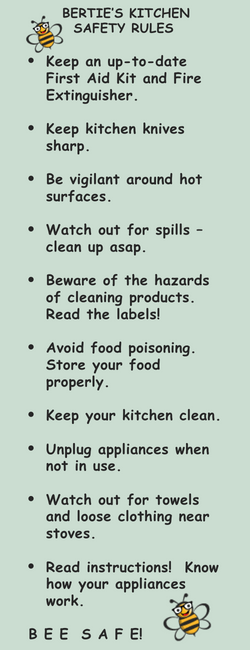










Member discussion